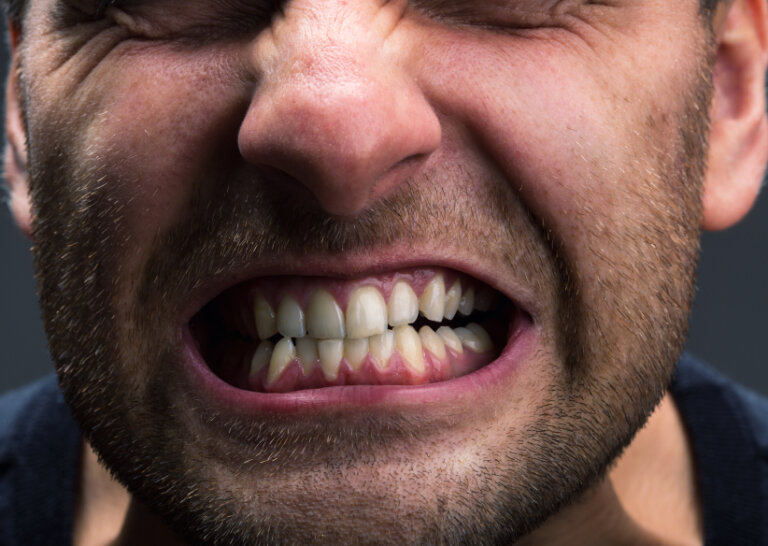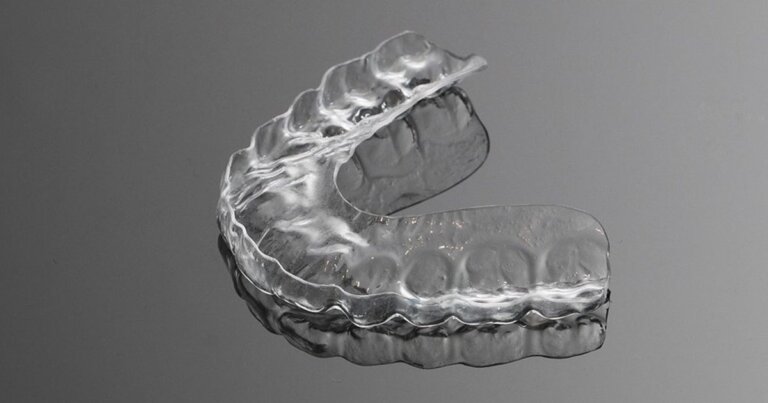Teeth Clenching

What Is Teeth Clenching?
Teeth Clenching, also known as jaw clenching, is a common condition that involves involuntarily tightening the jaw muscles, causing the teeth to press together with excessive force. While it is related to bruxism (teeth grinding), clenching typically involves sustained pressure without the grinding motion.
Teeth clenching can occur during the day or at night, and in some cases, people may not even be aware that they are doing it. Chronic teeth clenching can lead to a variety of dental problems, including tooth sensitivity, chipped, cracked or broken teeth. Before you contact a Toronto dentist to examine Teeth Clenching, there are some things you should know as a patient:
- What Causes Teeth Clenching?
- Signs And Symptoms Of Teeth Clenching
- Treatment Options For Teeth Clenching
- Managing Teeth Clenching Until You Can See The Dentist
- Frequently Asked Questions About Teeth Clenching
If you have questions about Teeth Clenching or other dental problems, please contact us for more information.
What Causes Teeth Clenching?
Teeth clenching can result from several factors, often interconnected. Understanding the root cause is essential for effective treatment.
- Stress and Anxiety: Stress-induced muscle tension in the jaw can lead to clenching.
- Sleep Disorders: Conditions like obstructive sleep apnea (OSA) may cause clenching as the body adjusts to maintain airflow.
- Medications: Certain medications, including some antidepressants and antipsychotics, list clenching as a side effect.
- Bite Misalignment: Improper alignment of the teeth may cause clenching as your jaw seeks a comfortable resting position.
- Lifestyle Habits: High caffeine or alcohol intake and smoking are linked to increased muscle activity in the jaw.
If you’re experiencing chronic teeth clenching, consult your dentist or doctor to identify the specific cause and develop a personalized treatment plan. If you have further questions about Teeth Clenching, please contact us.
Signs And Symptoms Of Teeth Clenching
Teeth clenching can manifest in various ways, often impacting both oral health and overall well-being.
- Jaw Pain: Soreness or discomfort in the jaw muscles, especially upon waking.
- Headaches: Persistent tension headaches, often starting near the temples or the back of the head.
- Tooth Sensitivity: Increased sensitivity to hot or cold foods due to enamel wear.
- Damaged Teeth: Chipped, cracked, or broken teeth from excessive pressure.
- Enlarged Jaw Muscles: Overuse of jaw muscles can cause a noticeable change in the face, leading to a square jaw appearance.
It is important to seek treatment for teeth clenching if you experience any of these symptoms. Left untreated, teeth clenching can lead to further complications and more extensive dental work. If you have further questions about the signs and symptoms of Teeth Clenching, please contact us.
Treatment Options For Teeth Clenching
Treatments vary depending on the severity and underlying cause of the condition. Common options include:
- Night Guards: Custom-fitted mouthguards protect teeth from damage by absorbing the force of clenching during sleep.
- Stress Management: Relaxation techniques, exercise, or therapy can help reduce stress-related clenching.
- Medications: Muscle relaxants or other medications may be prescribed to relieve symptoms.
- Dental Procedures: In severe cases, crowns, veneers, or other restorative treatments may repair damaged teeth.
- Sleep Apnea Treatment: If clenching is related to sleep apnea, a CPAP machine may be recommended to ensure continuous airflow during sleep.
It is important to consult with a dental professional to determine the best course of treatment for your individual case of teeth clenching. If you have further questions about how to treat your teeth clenching habit, please contact us.

Managing Teeth Clenching Until You Can See The Dentist
While waiting to see a dentist, these tips can help alleviate discomfort:
- Apply Warm Compresses: Relax tight jaw muscles with a warm compress.
- Practice Jaw Exercises: Gentle movements, like side-to-side jaw stretches, can relieve tension.
- Take Over-the-Counter Pain Relievers: Medications like ibuprofen or acetaminophen can reduce pain and inflammation.
- Avoid Hard or Chewy Foods: Stick to soft foods to minimize strain on your jaw.
- Reduce Stress: Engage in relaxation techniques like deep breathing, meditation, or yoga.
These strategies provide temporary relief and do not address the root cause. A dental consultation is crucial for proper diagnosis and treatment. If you have further questions about how to manage Teeth Clenching, please contact us.
Frequently Asked Questions About Teeth Clenching
- How do I know if I’m clenching my teeth at night?
You may wake up with a sore jaw, headaches, or sensitive teeth. Ask your dentist about signs of clenching, as they can often spot wear patterns on your teeth.
- Is teeth clenching always caused by stress?
No, while stress is a common trigger, other factors like sleep apnea, medications, and misaligned teeth can also cause clenching.
- Can teeth clenching damage my teeth permanently?
Yes, prolonged clenching can lead to enamel wear, tooth fractures, and even tooth loss if untreated. Seek dental care to address the issue early.
- Will a night guard cure teeth clenching?
A night guard can protect your teeth and alleviate symptoms, but it does not treat the underlying cause. Additional treatment may be necessary depending on the cause.
If you’re experiencing teeth clenching or related symptoms, don’t wait for it to worsen. At Atlas Dental, we’re dedicated to protecting your smile and helping you achieve optimal oral health. Contact Us for expert help with teeth clenching.

